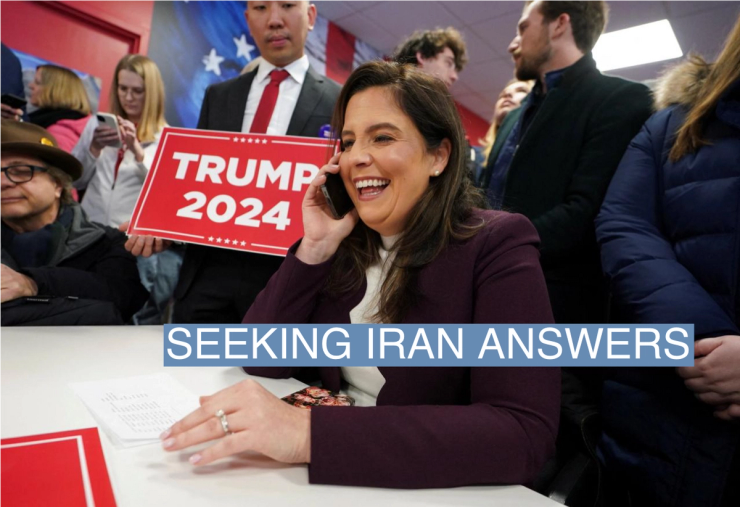The Scoop
Three Republican lawmakers are requesting the U.S. Department of Justice open an investigation into the International Crisis Group, a Brussels-headquartered conflict resolution and advocacy group, to determine if it acted as an unregistered agent for the government of Iran.
The representatives, in a letter sent to Attorney General Merrick Garland this week, cited recent articles by Semafor that documented two research partnerships Crisis Group and two of its members entered into with Iran’s Foreign Ministry over the past decade, but which were not disclosed publicly. These arrangements were in place while Crisis Group was one of a number of NGOs seeking to shape U.S. policy on Iran going into the 2015 nuclear deal the Obama administration forged with Tehran, and after.
“There is a clear pattern of behavior indicating that the Crisis Group is in fact not an independ ent organization, but a chief mouthpiece of the Islamic Republic of Iran in the United States,” the letter reads, which was signed by Jim Banks of Indiana, Elise Stefanik of New York, and Mike Waltz of Florida.
The U.S.’s Foreign Agents Registration Act, or FARA, stipulates that any individual or organization that works to advance the interests of a foreign government inside the U.S. must register with the Department of Justice and regularly disclose their meetings and activities. The law doesn’t require that a person or party necessarily be funded by an overseas government, and particularly focuses on whether they’re trying to influence American media, Congress or U.S. government officials.
Crisis Group’s spokesperson, Elissa Jobson, told Semafor Wednesday, in response to the letter, that the organization was in compliance with all U.S. laws, including FARA. “Crisis Group only acts to resolve conflict, not for or on any country’s behalf,” she said. “Iran’s threats to our staff and accusations that we work for the US and Israeli governments have been ongoing for more than a decade and underscore our independence.”
Last week, Semafor reported that Crisis Group signed a formal MOU with the Iranian Foreign Ministry’s in-house think tank, the Institute for Political and International Studies (IPIS), in 2016 to collaborate on research. The agreement has a provision to be automatically renewed every four years, but it’s not clear if it was or not. Semafor also revealed in September that two Crisis Group researchers, Ali Vaez and Dina Esfandiary, were involved in an Iranian-backed research group, called the Iran Experts Initiative, which Tehran hoped to use to advance its positions on the nuclear issue beginning in 2014.
“The Crisis Group’s actions clearly represent potential violations of FARA and merit a full investigation,” the lawmakers wrote. “Iranian government officials believe that the Crisis Group lobbied on its behalf in public and before officials of the United States.”
Crisis Group’s president and chief executive officer from 2018 to 2021, Robert Malley, served until last spring as the Biden administration’s special envoy to Iran. The State Department placed him on administrative leave after the Diplomatic Security Service pulled his security clearance last April. The FBI is currently investigating Malley for his alleged mishandling of classified information.
Details about Crisis Group’s MOU with IPIS and the Iran Experts Initiative were revealed in a large cache of Iranian Foreign Ministry emails that were obtained by the Persian-language broadcaster, Iran International, and shared with Semafor.
The View From The International Crisis Group
Crisis Group, in interviews with Semafor and its own writings, has cited its efforts to promote the Iran nuclear agreement as part of the institution’s most important work. It says its members seek to bridge differences between parties, such as the U.S. and Iran, but doesn’t advocate for any side. “We have only one constituency: local communities at risk of or affected by deadly conflict, which we aim to prevent, mitigate and resolve,” Jobson said.
Crisis Group declined to say if its MOU with the IPIS think tank in Tehran was still in place. Other Western institutions, such as the Munich Security Conference, Polish Institute of International Affairs, and Stockholm International Peace Research Institute have forged partnerships of various types with IPIS since the 2015 nuclear deal and despite its staging in 2006 of a major international conference questioning the historical record about the Holocaust.
Crisis Group disputes Semafor’s characterization of the Iran Experts Initiative being led and overseen by the Iranian Foreign Ministry. Crisis Group contends the IEI was an informal body to discuss Iran’s nuclear program, and that it received funding from European think tanks and one European government, which Semafor’s Steve Clemons has identified as the U.K.
Jay’s view
Crisis Group is at risk of being drawn into the current political election cycle; with Iran emerging as a major foreign policy issue in the wake of the Palestinian militant group Hamas’ October terrorist attack on Israel. In this climate, debates over U.S. policy towards the Islamic Republic – which backs Hamas – and the status of the Biden administration’s suspended envoy, Robert Malley, are likely to grow.
One of the signatories to the letter, Congresswoman Elise Stefanik, has emerged as a potential vice presidential running mate for the Republican frontrunner, Donald Trump. She’s led the Republican push this year to investigate antisemitism on U.S. college campuses, which included the grilling of the presidents of Harvard, MIT, and the University of Pennsylvania during a December congressional hearing. (Two of the presidents have since resigned.)
Stefanik told Semafor in a statement: “We must investigate the depths of Crisis Group’s employees’ involvement in advocating on behalf of the Iranian regime while simultaneously trying to influence Biden Administration officials.”
Malley also remains a lightning rod for Republican criticism of the Biden administration’s Iran policy. Congressman Banks, who filed last week to run for the U.S. Senate from Indiana, said: “Joe Biden’s disgraced former Iran envoy ran a foreign think tank that had entered into an undisclosed formal agreement with an Iranian government organization which denies the Holocaust.”
Notable
- Since October 7, the U.S. has increased financial sanctions on Iran and other entities that support Hamas. This has included an Iraqi airline and cryptocurrency platforms.


